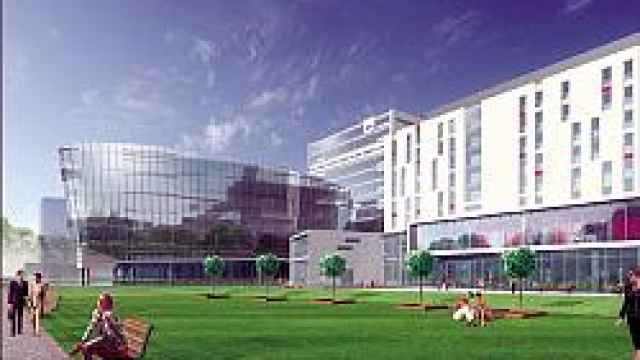But talk is cheap. Despite low supply and high demand, occupancies at all-time highs and steeply climbing room rates, no new major hotel has opened in the capital since the fall of 2002.
The difficulty of entering the market seems to be just as high as the city's potential for new hotels. Bureaucratic hurdles, coupled with high development costs, are driving both domestic and foreign hotel operators to the regions, where market entry is significantly easier and competition virtually nonexistent.
Although City Hall has said it wants to double -- if not triple -- the number of hotel beds, the total has actually decreased by several hundred rooms after the Moskva hotel was closed for reconstruction last year.
'Under-Hoteled' Moscow
Moscow lags behind most European cities in the number of quality hotels, with a mere 5,000 international-standard rooms.
And demand is fast outpacing the meager supply.
"You tend to get demand building slowly over a period of time. But in Moscow -- because economic growth is so rapid -- demand has grown exponentially," said Mark Wynne-Smith, managing director at Jones Lang LaSalle Hotels in London.
"The market has gone from being in a fairly unhappy position three or four years ago to the one we have now."
Since 2001, average room rates in Moscow's upmarket hotels have grown 30 percent and reached almost $200 per night, Ernst & Young estimates, while revenue per room has increased 45 percent in the same period.
Average annual occupancies jumped from roughly 50 percent in 2000 to over 70 percent last year.
As there are no new hotels due to open this year, the trend is likely to continue in 2004.
"It is a great time to be a hotel in Moscow," said Scott Antel, partner at Ernst & Young. "The city is severely under-hoteled."
As a result, Moscow has recently attracted additional interest from international operators -- some of them not yet present in Russia -- who now are "all leaping after projects," Wynne-Smith said.
"Twelve months ago I expected everybody to be very cautious about Moscow, and what is clear is that caution has gone to almost nothing," he said.
"Moscow has become one of the key markets at the moment because all the operators want to get here."
This year was the first time that Russia was referred to as the "place to be" at a recent hotel investment conference in Berlin, Antel said.
"Before that, no one was really that keen," he added. "But this time several hotel operators said Russia was their top priority."
The question is increasingly not whether to come to Moscow, but how to gain a foothold here. As the city is running out of prime sites for hotel development, the competition to grab them will only intensify.
"These are once-in-a-generation opportunities," Wynne-Smith said, referring to the former Intourist site on Tverskaya Ulitsa and the Moskva, which is currently being reconstructed from the ground up.
"You won't get those sites replicated ever again. Once those are gone, you will be back by one or two kilometers from the center," he added.
Pulling Teeth
Dubbed the "rotten tooth of Moscow" for its ugly glass-and-concrete design, the Soviet-era Intourist hotel was demolished in 2002. It was to be replaced by a five-star Western-branded hotel -- reportedly a Hilton -- by the end of this year, but construction has not yet begun at the site.
Located next door to the historic National Hotel and just 400 meters from the Kremlin wall, the property was recently sold to a new investor. Information on the development's future has not been made public.
Secrecy also surrounds the fate of the Stalin-era Moskva hotel, where demolition work began late last year. A Western operator, whose name has not been announced, has recently won a tender to run the hotel once it is completed, said a source familiar with the deal.
Although the facade of the new building will be an exact replica of the historic 1935 hotel, its interior will be completely redesigned; three underground floors will be added; and its total area will be roughly 180,000 square meters, almost twice the size of the original.
Only a small fraction -- some 24,000 square meters -- is planned to be devoted to a hotel, while the rest will be used for offices and stores.
Like the hotel project on the Intourist site, the Moskva development is already behind schedule. Experts say it is unlikely it will meet the official deadline of late 2006.
Such Soviet-era landmark hotels as the Rossiya, Leningradskaya, Peking and Minsk are also scheduled for reconstruction in the near future. But work has not begun on any of them.
City Hall's Grasp
There are several reasons why these high-profile projects have had difficulty taking off in Moscow. Market watchers blame a combination of lack of transparency, red tape, corruption and lack of coordination between developers and operators for the fact that even projects that appear to have City Hall's blessing are lagging behind.
Additionally, City Hall -- which either directly or through its subsidiaries and affiliates owns controlling stakes in almost all Moscow hotels -- has a tight grasp on the hospitality industry. Such control of the local market by a city government is unparalleled anywhere else in Russia.
"There is a contradiction between what is being said and what is being done," said Stephane Meyrat, a senior consultant at Hotel Consulting & Development Group.
"On the one hand, City Hall makes many announcements about prodigious hotel expansion. On the other, there is too much red tape and too many tied hands to get projects beyond the drawing board."
Many developers complain that while finding financing was the main problem in the past, now it is securing plots. The process of land allocation in Moscow lacks transparency and sites offered by City Hall often are not suitable for hotel development, experts say.
Moving Out
While not a single large hotel has been opened in Moscow since the fall of 2002, last year saw an explosion in hotel construction in the regions.
 For MT Construction has started on the ambitious Novocity development in Novorossiisk. | |
Several other international hotel operators, including SAS Rezidor, Accor and Kempinski, have announced ambitious expansion plans.
GVA Sawyer, in association with Russian financial-industrial group Kesco and French hotel operator Accor, has recently announced a project that foresees construction of Novotel and Ibis hotels in St. Petersburg, Novorossiisk, Krasnodar, Novosibirsk, Rostov-on-Don, Ufa and Yekaterinburg.
Construction is currently under way on the ambitious Novocity development in the Black Sea port of Novorossiisk. In addition to a 156-room Novotel, the 97,000-square-meter project includes offices, entertainment venues and apartments. The first stage is scheduled for completion in the fall of 2005.
Scandinavian-owned SAS Rezidor is aiming to build Park Inn hotels in Nizhny Novgorod and Yekaterinburg.
Negotiations are said to be in the final stages between British-based Intercontinental Hotels and the Russian Gold company to build at least 40 Express by Holiday Inn hotels across the country in the next five years.
Russians Set Standards
But it is Russian-managed nonbranded hotels that are making the greatest inroads on the market in the regions. They are catering to the demands of the emerging middle class, which has become accustomed to Western service standards.
 For MT The Novocity project includes a hotel, offices, entertainment venues and apartments. | |
"The regions offer less red tape and swifter market penetration."
Quality local hotels of the three-star standard are not only appearing in Black Sea resorts but in regional centers all over the country -- in Kazan, Smolensk, Cheboksary, Voronezh, Yaroslavl and Tver, to name a few.
"Unless global brands enter the market now, they will probably find that they have very strong competition," said Jones Lang LaSalle's Wynne-Smith.
One of the advantages of building hotels in the regions is that they are often perceived as "amenities to the city," thus making local bureaucracy more supportive, said Ernst & Young's Antel.
"In the regions you are a much bigger fish [than in Moscow]."
Of course this perception could cause a developer to be seen as a "cash cow," he said, but it also means that access to local authorities is easier than in the capital.
At the same time, while hotel development is simpler in most regions, the potential returns may also be not as significant.
The Renaissance Samara hotel has reportedly achieved only a 30 percent occupancy so far, prompting the question of whether there is strong demand for quality hotels in the regions.
"This could be a wrong type of product for Samara since the Renaissance is an upmarket hotel," Antel said.
With Western hotel brands still absent in virtually all of Russia's regional cities, it does not take much to become the destination of choice for quality-conscious travelers.
"If you build a Western-standard mid-market hotel in any of those regional cities, it will be the best hotel in town," said Robert Stoddard, a hotel development director at Colliers International.
"You don't have to spend $200,000 per room to be the best hotel, you can spend $100,000 and still be No. 1."
… we have a small favor to ask. As you may have heard, The Moscow Times, an independent news source for over 30 years, has been unjustly branded as a "foreign agent" by the Russian government. This blatant attempt to silence our voice is a direct assault on the integrity of journalism and the values we hold dear.
We, the journalists of The Moscow Times, refuse to be silenced. Our commitment to providing accurate and unbiased reporting on Russia remains unshaken. But we need your help to continue our critical mission.
Your support, no matter how small, makes a world of difference. If you can, please support us monthly starting from just $2. It's quick to set up, and you can be confident that you're making a significant impact every month by supporting open, independent journalism. Thank you.
Remind me later.



